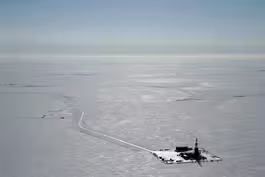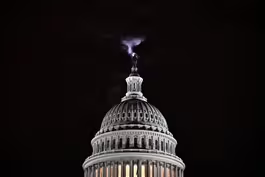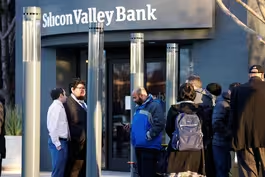
Drought, overdevelopment cause record low water levels
Clip: 3/13/2023 | 8m 2sVideo has Closed Captions
Persistent drought and overdevelopment cause record low water levels for tens of millions
Despite a rainy and snowy winter out west, Lake Powell and Lake Mead, the reservoirs that provide water for 40 million Americans, are at record low levels due to the ongoing megadrought. Arizona is set to lose over 20% of its Colorado River water allotment this year alone. As Stephanie Sy reports, that’s leaving communities across the state scrambling to find alternatives.
Problems playing video? | Closed Captioning Feedback
Problems playing video? | Closed Captioning Feedback
Major corporate funding for the PBS News Hour is provided by BDO, BNSF, Consumer Cellular, American Cruise Lines, and Raymond James. Funding for the PBS NewsHour Weekend is provided by...

Drought, overdevelopment cause record low water levels
Clip: 3/13/2023 | 8m 2sVideo has Closed Captions
Despite a rainy and snowy winter out west, Lake Powell and Lake Mead, the reservoirs that provide water for 40 million Americans, are at record low levels due to the ongoing megadrought. Arizona is set to lose over 20% of its Colorado River water allotment this year alone. As Stephanie Sy reports, that’s leaving communities across the state scrambling to find alternatives.
Problems playing video? | Closed Captioning Feedback
How to Watch PBS News Hour
PBS News Hour is available to stream on pbs.org and the free PBS App, available on iPhone, Apple TV, Android TV, Android smartphones, Amazon Fire TV, Amazon Fire Tablet, Roku, Samsung Smart TV, and Vizio.
Providing Support for PBS.org
Learn Moreabout PBS online sponsorshipGEOFF BENNETT: Despite a rainy and snowy winter out West, Lake Powell and Lake Mead, the reservoirs that provide water for 40 million Americans, are at record low levels due to the ongoing megadrought.
Arizona is set to lose over 20 percent of its Colorado River water allotment this year alone.
As Stephanie Sy reports, that's leaving communities across the state scrambling to find alternatives.
STEPHANIE SY: Karen Nabity built her dream house in the Rio Verde Foothills, an unincorporated area outside Phoenix, with gorgeous mountain views, lower taxes, and no paved roads.
KAREN NABITY, Rio Verde Foothills, Arizona, Resident: So, we're collecting rainwater off the roof, and this is the water we're using to flush our toilets.
STEPHANIE SY: There's also no municipal water supply.
The lucky residents have wells that are still yielding water.
Nabity has for years paid haulers to bring water from the closest city, Scottsdale, every six weeks, storing it in an underground tank.
KAREN NABITY: We got water before Christmastime, and we still are -- have like 70 percent of our water in the tank.
STEPHANIE SY: OK. And you think it'll be another two or three months before you would need to refill the tank?
KAREN NABITY: Yes, Yes, because we're being really conservative.
STEPHANIE SY: On January 1, the city of Scottsdale cut them off.
KAREN NABITY: We have over 1,000 people, they're without a source of water for their homes right now.
And that's just absurd that we're having to live like were camping in our homes.
DAVID ORTEGA, Mayor of Scottsdale, Arizona: We have two calamities, the megadrought, and we have the calamity created by the state legislature, which permitted dry lot subdivisions.
They're building homes with no water.
STEPHANIE SY: Scottsdale Mayor David Ortega says he made the decision to protect his own constituents in a time of severe, persistent drought.
DAVID ORTEGA: This is why the noise from Rio Verde was so minuscule compared to what I deal with every day and the other mayors deal with of Phoenix, Mesa and so forth.
So it is a race.
STEPHANIE SY: Scottsdale's population of 250,000 relies on the Colorado River for the majority of its water, and the mayor is preparing for the federal government to cut up to 40 percent of the city's current allotment in the next year.
DAVID ORTEGA: The entire state of Arizona and Scottsdale, in particular, are going to have to go on a water diet.
STEPHANIE SY: The Colorado River is in crisis.
SARAH PORTER, Director, Kyl Center for Water Policy, Arizona State university: We're talking about water not running in the Colorado River, potentially below Lake Powell, which is the Grand Canyon.
STEPHANIE SY: Sarah Porter, the director of the Kyl Center for Water Policy at Arizona State university, sums up the problem.
SARAH PORTER: We're in the most serious situation we have ever been in, and it's really, truly serious.
We're seeing hotter and drier conditions persistently in the Upper Rockies, where the water that flows in the Colorado River comes from.
Also, we have the problem of overallocation and a fully developed use by all the different entitlement holders.
STEPHANIE SY: The Bureau of Reclamation, which in 2021 made its first declaration of a Colorado River shortage, is refereeing the water battles in the West, forcing states to come up with a plan to reduce water use to avoid the catastrophic collapse of the whole system.
SARAH PORTER: It's too difficult in a few short months to get to another multistate, binational agreement.
I think federal action is more likely.
KAREN NABITY: We asked them, has your well gone dry?
And over 50 people said yes.
STEPHANIE SY: Said yes?
OK.
The troubles Rio Verde Foothills residents face show how quickly cooperation can turn to conflict.
And the Colorado River isn't the only pain point.
Years of urban development on the outskirts of Phoenix have depleted groundwater.
SARAH PORTER: So, we now have two groundwater basins where the state is saying, there's not enough groundwater for any more development that depends on groundwater.
STEPHANIE SY: One of those basins feeds the city of Buckeye; 35 miles west of Phoenix, it's a rapidly expanding city with a current population of more than 100,000.
In recent years, Buckeye has been flooded with developers, but a report released earlier this year by Arizona's Department of Water Resources found that the city may not have enough supply to support its planned growth.
ERIC ORSBORN, Mayor of Buckeye, Arizona: They're spot on with the idea that, if we continue to just grow off of groundwater, without replenishing the water in the basin and bringing in new water resources, that we will have problems in the future.
STEPHANIE SY: Like the Scottsdale mayor, Buckeye Mayor Eric Orsborn is on a race to find more water supplies.
He says the current supply is enough to continue to grow Buckeye for two decades.
But some residents are getting nervous.
Kathi Kucharski moved to Buckeye in 2021.
KATHI KUCHARSKI, Buckeye, Arizona, Resident: I blindly said, people are not going to keep building homes and building homes when there isn't any water.
What scares me about that are the developers that are developing all of this.
Have they done their due diligence to make sure there's a 100-year water supply, like people claim there's supposed to be?
STEPHANIE SY: As in other parts of the West, urban growth is competing with agriculture for the shrinking water supply in Arizona.
Caywood Farms in Pinal County has had a year of plentiful rain, but the last two summers were brutal.
They didn't receive their usual allotment of water from the nearby Gila River due to drought, forcing them to shut down production entirely.
NANCY CAYWOOD, Caywood Farms: When we go around the corner, there's a little gray house.
STEPHANIE SY: Nancy Caywood, a third-generation farmer, says they have had to pivot to make ends meet.
Farm tours have brought in some new revenue.
NANCY CAYWOOD: Agriculture has been in this area since who knows when.
It's been here for so many years.
And, you know, you're sitting there and it's snowing wherever you live and you're eating a salad.
Guess what?
It came out of Arizona.
STEPHANIE SY: Some farmers in Arizona have already sold their land.
Others have taken up what are called buy-and-dry offers, to leave their fields unplanted, thereby giving up their water.
Nancy wants to keep farming.
Growing food and feed, she says, should take priority over urban development.
NANCY CAYWOOD: Because Agriculture is freedom.
Agriculture is food safety.
STEPHANIE SY: ASU's Sarah Porter says that Arizona's farmers and municipalities are taking the steps needed to allow for continued growth.
SARAH PORTER: It's a tough point.
Nobody likes it.
There's lots of fighting and finger-pointing and name-calling.
But the problem that we're really facing is a very solvable problem.
STEPHANIE SY: The solutions, Porter says, include what Arizona's big cities are already doing, upcycling water, reclaiming it, conserving it, and moving it to where it's really needed.
Whether that includes the Rio Verde Foothills, where Karen Nabity is using buckets of rainwater to flush her toilet, remains in question.
What does the future look like for you here?
KAREN NABITY: I don't know.
I'm the glass is half full of water.
(LAUGHTER) KAREN NABITY: And, for me, I feel like we will end up with a solution.
But I wish that we could get the politicians to stop playing politics, and let's talk about water and just get this done.
STEPHANIE SY: But it's not done.
The politicians have still not agreed on a plan to get water to the Rio Verde Foothills.
For the "PBS NewsHour," I'm Stephanie Sy.
Biden approves controversial oil drilling project in Alaska
Video has Closed Captions
Clip: 3/13/2023 | 4m 44s | Controversial oil drilling project in Alaska approved by Biden administration (4m 44s)
Congress battles over priorities, but finds some agreement
Video has Closed Captions
Clip: 3/13/2023 | 5m 16s | Congress battles over conflicting priorities, but finds some bipartisan agreement (5m 16s)
Government takes steps after collapse of banks sparks fears
Video has Closed Captions
Clip: 3/13/2023 | 11m 30s | Government takes steps to shore up confidence after collapse of two banks sparks fears (11m 30s)
How 'Everything Everywhere All at Once' may change Hollywood
Video has Closed Captions
Clip: 3/13/2023 | 9m 3s | How the Oscar wins for 'Everything Everywhere All at Once' could change Hollywood (9m 3s)
The risks student-athletes face amid sports betting boom
Video has Closed Captions
Clip: 3/13/2023 | 8m 46s | The risks student-athletes face amid sports betting boom (8m 46s)
Providing Support for PBS.org
Learn Moreabout PBS online sponsorship
- News and Public Affairs

FRONTLINE is investigative journalism that questions, explains and changes our world.

- News and Public Affairs

Today's top journalists discuss Washington's current political events and public affairs.












Support for PBS provided by:
Major corporate funding for the PBS News Hour is provided by BDO, BNSF, Consumer Cellular, American Cruise Lines, and Raymond James. Funding for the PBS NewsHour Weekend is provided by...




